- Home
- Sharyn McCrumb
Elizabeth MacPherson 07 - MacPherson’s Lament Page 5
Elizabeth MacPherson 07 - MacPherson’s Lament Read online
Page 5
“At the courthouse,” said Edith. “She’s got another case. Guy accused of writing bad checks. I said, ‘Could we get him to pay us in cash, you reckon?’ But she was not amused.”
“He’s one of Powell’s indigent clients, so I think the state will be footing the bill,” Bill pointed out. “Besides, we’re not supposed to think he’s guilty.”
“Uh-huh.” Edith did not sound convinced. “Maybe you’re not. I have to see that the bills get paid, and I balance the books for this firm. By the way, you got a message this morning. Do you feel up to taking it yet?”
“Depends. Is it Mr. Trowbridge with another crazy question?”
“No. It’s somebody calling about that house ad you had me run in all those newspapers up north. He sounded interested.” She held out a pink message slip. “Try not to sound too eager, though. In real estate deals it makes people suspicious.”
“I’ll keep that in mind,” said Bill. He ambled off to his office to earn his keep.
He was pleased that a response to his ad had come so quickly, but he wasn’t really surprised. It was a wonderful house. He had gone by to visit it at the first of last week, and it really was a period piece. (As were its inhabitants, he thought.) The white colonial house with Corinthian columns and a circular portico was in need of minor repairs—new shutters, perhaps, and a coat of paint—but its interior of hardwood floors and high-ceilinged rooms rich with carving was in perfect condition, lovingly cared for by its house-proud occupants. From the sweeping oak staircase in the front hall to the dormer rooms in the well-swept attic, the house was wonderful. Bill wished he could buy it himself, but the asking price of one million, five hundred thousand was well beyond his means. In fact, he would be hard-pressed to afford the paint for the shutters at his current income level.
Still, he supposed that someone living in the exorbitant urban sprawl between New York and Boston might consider one point five million a bargain price for six thousand square feet of historic house on three acres of oak-shaded lawns.
Bill decided that he wouldn’t have any trouble conveying his enthusiasm for the property, which was just as well, because he thought that the conditions of sale verged on eccentric. They’re little old ladies, he reminded himself. At their age, they’re entitled to be a little strange. They were certainly charming when he visited them, though, dishing out slices of homemade chocolate cake with pecans and fussing over him as if he were a visiting prince. He wanted to sell their house for them as swiftly and profitably as possible so that they could retire to their suburban nursing home carefree and financially secure. The transaction would do wonders for his financial position as well. If it hadn’t been for his bank’s overdraft protection plan, Bill could easily have been another of his partner’s bad-check cases.
Mentally ticking off the bills he could pay with his five percent commission, Bill dialed the phone number on the message slip.
Ten minutes later, in a considerably brighter mood, Bill placed another call, this one to Miss Flora Dabney at the Home for Confederate Women. By the time he heard her silvery voice on the other end of the line he was almost humming, his back problems and his parents’ strife neatly banished from his thoughts. “Miss Flora? This is Bill MacPherson, your attorney, and I have good news.”
“Has someone responded to your ad? So soon?”
“I just spoke to him and he’s very interested in the house. His name is John Huff. He lives in Connecticut, but he’d like to acquire a house in Virginia.”
Flora Dabney did not seem overly thrilled by the news. After a brief pause she said, “Did you tell Mr. Huff our terms, Bill?”
“Certified check? Yep. I explained that you wanted a quick sale, and that you didn’t want the transaction tied up in bank-loan red tape. Mr. Huff said that there wouldn’t be any problem about financing. I think he’s loaded. He’d like to fly down and view the house. Would Wednesday afternoon suit you, Miss Flora? I promised I’d call back and let him know.”
After a protracted silence, Flora Dabney said, “I suppose Wednesday would be all right. Will you be available that afternoon, Bill?”
“Yes, of course,” said Bill, whose afternoons were usually spent doing crossword puzzles. “I thought I’d meet Mr. Huff at the airport and bring him out to the house. What time would you like us to arrive?”
There was another longish pause at the other end of the telephone. “Bill,” Flora Dabney said at last, “we want you to show Mr. Huff the house. We’ll leave the key in the mailbox for you.”
“You want me—” Bill stared at the phone as if it had misquoted Flora Dabney.
“Yes. You show the house. We think that would be best. This house has been home to us for many years now, and naturally we feel a bit emotional about having to part with it, even though we have agreed that it’s for the best. Still, I don’t think any of us are up to the task of showing our beloved house to a stranger. Did he sound like a Northerner to you, Bill?”
“I guess so,” said Bill, who hadn’t given the matter any thought until now. “But don’t you think you’d be in a better position to answer any questions he might have about the property? I’ve only been in the house once. What if I get lost?”
Flora Dabney’s laugh was a silvery peal from a bygone belle. “Lost? Why, I just know that a clever young man like you couldn’t possibly do a silly thing like that. And you probably know all those amazing things about wiring and plumbing that we are just mystified by. You’ll do a splendid job of showing the Northern gentleman around. And don’t you worry about having us old ladies underfoot. The eight of us will all go out to tea that afternoon, so we won’t be in your way one little bit. Now phone Mr. Huff back and tell him that Wednesday will be perfectly fine.”
“But what if he wants to buy the house? What if he wants to make an offer? Don’t you want to meet him?”
“Why, no, Bill,” said Flora Dabney. “It isn’t necessary for us to meet the gentleman. We all trust your judgment.”
At the sound of the dial tone Bill replaced the phone and began to paw through the papers on his desk in seach of something to do. Amidst a stack of notes on Trowbridge questions, he found another pink memo with a message to himself in the angular handwriting of A. P. Hill. Title Search! the memo read.
Vaguely Bill remembered the conversation in which he had discussed the house sale with his busy law partner. Obviously she hadn’t trusted him to remember her advice, which was just as well, because in fact the task had slipped his mind. Pocketing the square of paper, Bill strolled out into the reception area, where Edith was counting the paper clips.
“I have an important job for you,” he announced in the hearty tones of one who hopes to be convincing.
“Go get your own hot dog,” said Edith without looking up from her task.
“No, this is a legal assignment,” Bill insisted. “I need you to go to the courthouse and look up the deed to a house. It’s called a title search. It’s the sort of thing that legal secretaries do, while attorneys devote themselves to more technical matters.”
“Okay,” said Edith. “You count the paper clips.”
“This will be time-consuming, but not difficult,” said Bill, wisely choosing to ignore her comments. In fact, Bill had never done a real title search, although they had certainly studied the art in law school until he thought he would go mad from boredom. Carefully he explained the procedure to Edith: how to look in the deed books, how to follow the chain of ownership back from one property transaction to another. “This will probably be very simple,” he assured her. “The house has belonged to the Confederate widows and daughters since the turn of the century. Just photocopy all the relevant pages and bring them back here, and I’ll check over them.”
Edith held out her hand. “I’ll need dimes and quarters for the copy machine.”
Bill fished out a handful of change from his pants pocket. There went lunch, he thought. After jotting down the salient points of the assignment on a yellow legal pad, Bill se
nt Edith off to the courthouse. Then he phoned John Huff with the good news: he could fly down on Wednesday and view the house.
The office of John Huff was an elegant lair of oak paneling and green leather, but in his own mind, Nathan Kimball referred to it as the Roach Motel, and he secretly dreaded every visit he was forced to make to his client’s inner sanctum. Kimball did not, of course, share these misgivings with the senior partners of Fremont, Shields, & Banks, because he was a very junior member of the law firm, and especially because John Huff was a wealthy and valued client. Mr. Huff did not, as far as Nathan Kimball could tell, spend his time evicting widows and orphans and tying village maidens to railroad tracks, but he looked as though he might. There was something of the nineteenth-century robber baron about Mr. Huff, and every time Nathan Kimball was obliged to visit him on legal business, he always found himself wishing that he had devoted his law practice to more mundane villains like car thieves. At least you knew where you stood with the small fry.
Huff, unconcerned with the tender feelings of his legal adviser, handed him a classified ad taped to a note card. “What do you think of that?” he demanded, dispensing as usual with preliminary civilities.
Kimball scanned the notice, a house-for-sale ad, with polite interest. There was a grainy photo of a structure reminiscent of Tara and a fulsome description of its amenities, which seemed to consist mostly of historic value, rather than practical accouterments such as air conditioning or master-bath Jacuzzis. Privately the attorney was wondering what he was expected to say. When inspiration failed, he murmured, “It’s—er—quite large. And old. Old and large. Are you thinking of investing in real estate, Mr. Huff?”
Huff laughed. “I’m thinking of acquiring this place. The price isn’t bad, but I think we might get them to come down a bit anyhow. I particularly like the location of the property.”
Kimball consulted the ad again. The house was in Danville, Virginia. Where on earth was that? he wondered. On the beach? A suburb of Washington, perhaps? Next to an orphanage? “You know the area then, sir?” he ventured, suppressing a nervous giggle.
“Never been there in my life,” Huff declared. “I suppose I will, though. Only a damn fool buys a piece of property sight unseen, and I am nobody’s fool. I may want to close quickly though. Thought I’d better let you know. Make sure you keep Wednesday open.”
“Er—this Wednesday?”
“Right. I’m going to fly down and take a look at the place. If it’s suitable, we stay until we close. Shouldn’t take but a day or so. The fellow I talked to down there doesn’t sound any too shrewd, so there shouldn’t be any difficulties. Still, I’ll need you to go along. That’s why I have lawyers. I expect you to look everything over, make sure it’s all right. Mostly I want you there to look intimidating. Have you got a better suit, Kimball? And I hate that tie.”
Nathan Kimball felt his face grow red as he fingered his birthday tie from Mother. He still felt that he was a few hundred yards behind in this conversation. “You want me to go with you to Virginia, sir?”
“Surely you grasped that,” said Huff with a touch of acid in his voice. “Yes, Kimball, I want you to go to Virginia. Go home and pack your jammies, Kimball, and tell the firm that you’re accompanying me on a business trip. We are going to purchase a historic house. Got it now?”
“But, sir, I know nothing about Virginia real estate law. Perhaps Mr. Shields—”
“You went to Yale, didn’t you, Kimball? Surely you can contend with these rubes from Mayberry, whether you know their local customs or not. We’re just going to buy a house, for God’s sake. Think of it as a little vacation.” John Huff bared his teeth in something resembling a grin.
“Yes, sir. Wednesday,” said Nathan Kimball. But he certainly wouldn’t think of it as a little vacation, he told himself. More like a white-collar skyjacking. For which he would have to go out and purchase a necktie. As he hurried out of the room, it occurred to him to ask Mr. Huff why on earth he wanted a house in Danville, Virginia. Somehow, though, the question wouldn’t come out of his throat.
A. P. Hill still felt a little jittery when she entered the jail to confer with a client. As the steel door closed behind her, she always imagined walking into an escape in progress, and getting caught in the cross fire between guards and inmates. As usual, though, all was quiet within. Lonnie at the reception desk looked up from his paperwork long enough to wish her good morning; otherwise, the place seemed empty. She could hear the faint strains of the radio from beyond the door to the cells, and a stiff wave of disinfectant told her that it was cleaning time in the pens. She resolved to make her visit as brief as possible. Her client didn’t require much counseling, anyway. It was a nothing case, almost certainly a plea bargain. That’s why they had tossed it to her, the newest lawyer on the list.
“I’m here to see Tug Mosier again,” she called out. “I’m his attorney.” She was always careful to wear her most conservative blue suit, low-heeled pumps, and only the tiniest gold earrings for her trips to the county jail. Powell would never have admitted her nervousness to Bill or to any of her male colleagues; she hoped it didn’t show. The best course seemed to be to do her job despite her fears and assume that sooner or later the anxiety would go away. A person could become used to anything, she reasoned; even to being locked in with dangerous felons.
“Tug Mosier, huh?” Lonnie whistled. “That’s going to be some case.”
“What do you mean? It’s just worthless checks. Though I admit that he shouldn’t have tried to post bail with another bad check. I may be able to get him off with time served.”
“You mean you haven’t heard yet? The finance company repossessed Tug Mosier’s car yesterday because he made his car payment with one of his rubber checks.”
“That’s too bad, but it won’t make any real difference to the case—”
“Don’t bet on it, counselor. The finance company found Tug’s girlfriend in the trunk. What was left of her.”
A. P. Hill sat down on the waiting room bench without even remembering to dust it off first. She felt cold and out of breath at the same time. Hot damn! she thought, hugging her briefcase. I’ve got my first murder case.
When Edith Creech returned from the courthouse, Bill was tidying his office. He had stacked his legal pads neatly on the corner of his desk. He had alphabetized the contents of his bookshelf. Now he was trying to dust the black-robed mascot Flea Bailey with his handkerchief.
“Hello! You’re back!” said Bill. “Can you send dead groundhogs to the dry cleaner, do you think?”
Edith rolled her eyes. “They’re gonna put you and Mr. Trowbridge in matching straitjackets. I got your paperwork here.” She tossed a sheaf of photocopies onto Bill’s just-dusted desk. “The house goes back to a Colonel Phillips in the late eighteen hundreds, and he left it to the Home for Confederate Women. It’s all in there. Is that what you wanted?”
“Yes. Thanks! I already knew all that, but we had to have the documentation for the buyer. Just a formality. Oh, and while you were out, Powell called in to report her big news. Her bad-check guy just turned into a murder case.”
“And A. P. Hill is defending him?”
“Right.”
“Good,” said Edith. “It’s about time they stopped being soft on criminals around here. How are your cases going?”
“I’ve sent Mr. Trowbridge the kitten question, and I’m waiting for his next salvo. I show the Home for Confederate Women to the first prospective buyer on Wednesday.” Bill laughed. “The buyer, Mr. Huff, wants me to meet him at the airport with a sign that says HUFF, so he can find me. I assured him that wasn’t necessary, but he insisted. Remind me to make the sign between now and Wednesday.”
“I’ll do it,” said Edith. “I print neater than you do. If he’s picky enough to want a sign, he might as well have a good one.”
“Thanks. Let’s see: what else have I got done? Oh, I’ve filed Civil Action Number 90-CI-something-or-other in circuit court, whi
ch basically says that my dad will continue to make the house payments and pay the car insurance and so on at the old homeplace until we get the whole mess sorted out.”
“Are you busy enough then, or do you want to run the newspaper ad advertising MacPherson and Hill for another two weeks? It’s time to renew.”
Bill thought about it. “Better run it,” he advised. “We could use a few simple wills and speeding tickets to generate some revenue around here. Besides, Powell gets nervous if she has time to eat dinner.”
Edith looked at her watch. “Well, I don’t. If I don’t feed my cat by six o’clock, he starts rooting in the houseplants. Pure spite, that’s what it is. So if you don’t need me for anything else …”
“No,” said Bill. “I guess I could call it a night, too, since nobody seems to be clamoring for my services. Maybe I could stop in and see how Dad is doing in his new place.”
“Isn’t that a whattayacallit? An ex parte communication?”
“Not if we just talk about dinner … the Redskins … neutral topics. But—er—you don’t have to mention this to my mother next time she comes in.” Bill was the picture of abject misery. “Edith, have you ever been divorced?”
“It was a good while back, and it wasn’t all that complicated. We didn’t have anything worth squabbling over. We had an old trailer, a lot of debts, no kids, and not much love left to lose, so it went pretty quick. I won’t be much help to you in figuring out your parents’ situation.”
“They’re behaving so strangely. It’s so hard to know how to fix it.”
Edith Creech said gently, “Well, Bill, they didn’t hire you to fix it.”
Margaret MacPherson was not thinking about her husband, Doug. She definitely was not. After five-thirty, the time when he would have been coming home from work, she had expended a considerable amount of energy ensuring that she would be much too occupied to remember his existence. She had watered the plants, vacuumed the spotless carpet, and reread the mail, even the bills and catalogues. In the background the television blared away for background noise, but she did not look at it. It was only a question of habits, she told herself; and one must be patient and give oneself time to change habits.

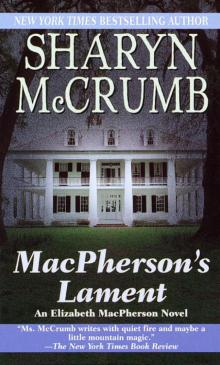 Elizabeth MacPherson 07 - MacPherson’s Lament
Elizabeth MacPherson 07 - MacPherson’s Lament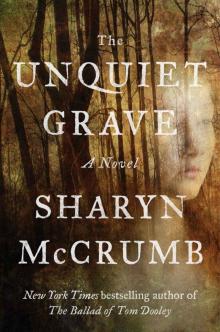 The Unquiet Grave: A Novel
The Unquiet Grave: A Novel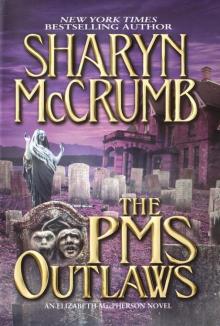 The PMS Outlaws: An Elizabeth MacPherson Novel
The PMS Outlaws: An Elizabeth MacPherson Novel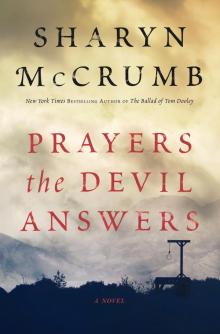 Prayers the Devil Answers
Prayers the Devil Answers Paying the Piper
Paying the Piper The Ballad of Tom Dooley: A Ballad Novel
The Ballad of Tom Dooley: A Ballad Novel Highland Laddie Gone
Highland Laddie Gone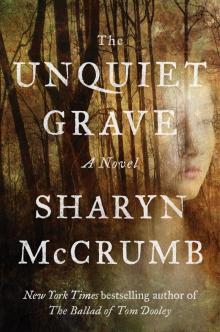 The Unquiet Grave
The Unquiet Grave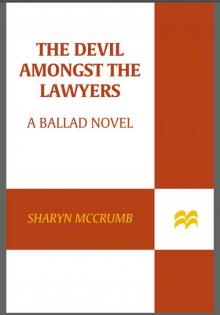 The Devil Amongst the Lawyers
The Devil Amongst the Lawyers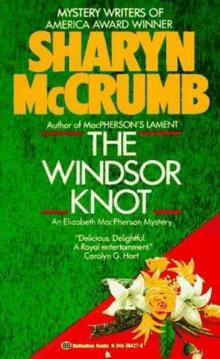 The Windsor Knot
The Windsor Knot The Hangman's Beautiful Daughter
The Hangman's Beautiful Daughter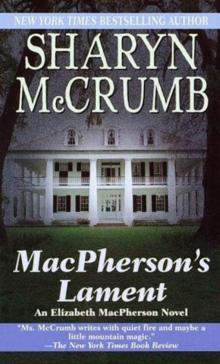 MacPherson's Lament
MacPherson's Lament The Ballad of Tom Dooley
The Ballad of Tom Dooley Once Around the Track
Once Around the Track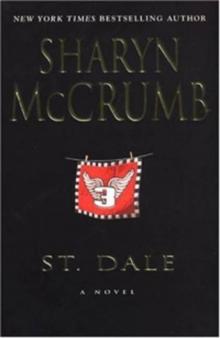 St. Dale
St. Dale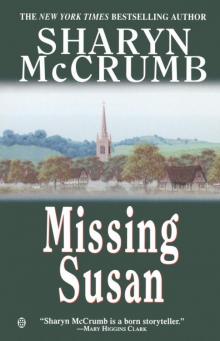 Elizabeth MacPherson 06 - Missing Susan
Elizabeth MacPherson 06 - Missing Susan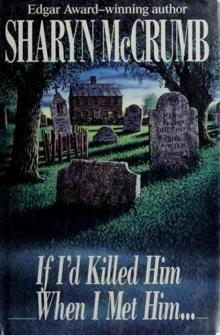 If I'd Killed Him When I Met Him…
If I'd Killed Him When I Met Him…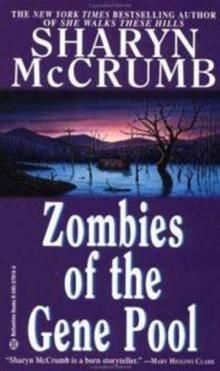 Zombies of the Gene Pool
Zombies of the Gene Pool Bimbos of the Death Sun
Bimbos of the Death Sun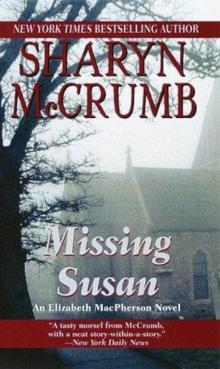 Missing Susan
Missing Susan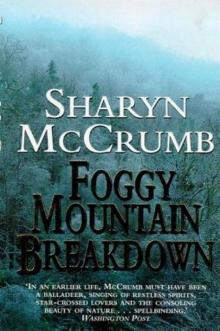 Foggy Mountain Breakdown and Other Stories
Foggy Mountain Breakdown and Other Stories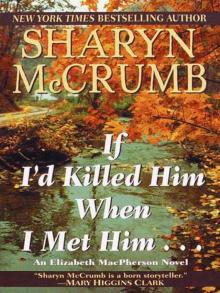 If I'd Killed Him When I Met Him
If I'd Killed Him When I Met Him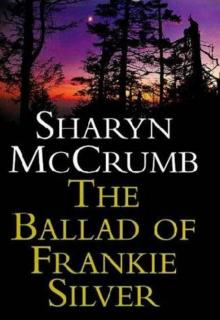 The Ballad of Frankie Silver
The Ballad of Frankie Silver Lovely In Her Bones
Lovely In Her Bones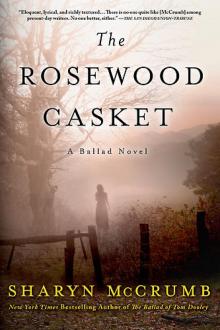 The Rosewood Casket
The Rosewood Casket King's Mountain
King's Mountain